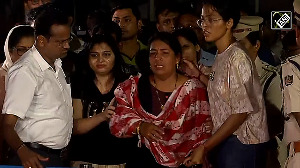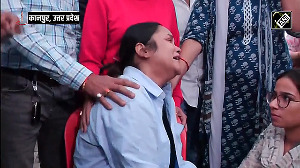Rulers in New Delhi and their political aides in sensitive states like Tamil Nadu have to be doubly careful not to provoke a situation whose consequences may be much more than visible now to the naked eye, notes N Sathiya Moorthy.

It is safe to assume that the Bharatiya Janata Party's Tamil Nadu President Kuppusamy Annamalai had the BJP high command's blessings when he sought an RTI response on the controversial Katchatheevu issue.
The way Narendra D Modi, Amit A Shah and a host of other BJP leaders at the national level pounced on to Annamalai's 'exposure' on what should tantamount to the 'treachery' by the father-daughter duo of Jawaharlal Nehru and Indira Gandhi, and the way then DMK chief minister M Karunanidhi in Tamil Nadu, played along, should remove all doubts that the BJP leaders had coordinated it all -- starting from the word 'Go' and the government's RTI response to the state BJP president.
There is no reason to question Annamalai's credibility that he has received the RTI response from the Centre and it says what he and others have since been saying it contains.
That a diplomat-turned politician in External Affairs Minister Subrahmanyam Jaishankar should take time off to address a hurriedlyc alled news conference at the BJP headquarters in New Delhi on the subject should remove all doubts about the seriousness with which the ruling party is approaching the issue and also the genuineness of the content in the RTI response to Annamalai.
Yet, there is the question if as a career diplomat going all the way up to become the nation's foreign secretary before becoming minister, Jaishankar believed that India had actually 'ceded' Katchatheevu to Sri Lanka, and that it was not a mutually accepted International Maritime Boundary Line (IMBL) that put the islet on the other side.
If anything, he himself as external affairs minister has stood by past decisions, both inside and outside Parliament, so to say.
Whatever that be and however much Modi wants to convince the nation's voters that he was not doing or saying everything only with elections in mind -- a line that he took in a rare and recorded interview to Thanthi TV in Tamil -- the BJP resurrecting an issue that is buried deep in the archives of the Government of India aims only at the current Lok Sabha polls.
By raking it up at a Meerut rally, Modi may have wanted to paint the Congress rival blacker than already.
However, it is not an election issue in southern Tamil Nadu where the issue belongs, as someone sitting elsewhere may want to assume.
In fact, no issue pertaining to southern Sri Lanka, barring the continuing presence of China, is news in the South Indian state. Even China is not an election issue.
It cannot be when the Sri Lankan ethnic issue was not, even though it continues to be a political issue and social concern, like the fishers dispute.
It is enough to recall how Vaiko, the indomitable defender of the LTTE, lost badly in his native Virudhunagar constituency in the crucial Lok Sabha polls of 2009, when Sri Lanka's ethnic war had already peaked and UPA-1 in New Delhi had obtained a fortnight-ceasefire from the Sri Lankan government of then president Mahinda Rajapaksa.
Sri Lanka and Sri Lanka-related issues are talking points in Tamil Nadu, but not election issues at any time.
BJP leader and later-day external affairs minister Sushma Swaraj found it for herself in 2014 when after her 'Kadal Thamarai' or 'Sea Lotus' campaign in the Rameswaram sea, the BJP did not gain a single extra vote anywhere in the state, starting with the Ramanathapuram constituency, where the temple island is situated.
If the Katchatheevu issue is not election material in the state this time, too, it is not without reason.
For the past three decades, the late Jayalalithaa and her AIADMK after her time, has been flogging the issue against the local DMK rival.
And on every occasion, the DMK would recall -- as it has done now -- how Karunanidhi had the state assembly pass a resolution against the Centre's unilateral decision to give away the tiny islet to the southern neighbour.
It is also true that the fishermen community in Rameswaram is well aware that there is no fish left around Katchatheevu for them to bother about the ownership and/or access to the tiny islet.
They showed their disinterest in participating in the annual St Anthony's feast at the isle-church along with their Sri Lankan Tamil fisher brethren from Jaffna and elsewhere earlier this year.
They boycotted the festivities, purportedly protesting against the arrest and court-ordered imprisonment of three of their brethren in the island-nation, for 'trespassing' and 'poaching'.
Next year on, if they wanted to return to participate in the festivities, the Sri Lankan side is not unlikely to cite this year's boycott, to deny them permission.

Put bluntly, the trawler-fishers from Tamil Nadu and the Karaikkal enclave of the Union Territory of Puducherry want access to fish in what India has conceded as Sri Lankan waters since the twin accords of 1974 and 1976, claiming it to be a 'livelihood issue' protected under international best practices.
Against this, the unanimous official Indian view since long, including those headed by Atal Bihari Vajpayee (1998-2004) and now, Modi since 2014, has only strengthened the Sri Lankan case of 'trespassing' and 'poaching' by the Indian fishers.
There is also ready acceptance that bottom-trawling and fishing by purse-seine nets are banned in both nations, owing to their destructive capacity, but enforced in Sri Lanka better than across the Palk Strait, in India.
The recent Indian conversion of the controversy into a 'livelihood issue' also for the Tamil Nadu fishers, has not registered in the Sri Lankan mind, official or fishers'.
Hence, the next meeting of the joint working group of officials, promised by the Centre before the Madras high court recently, is not going to achieve any breakthrough, whenever held.
Which may not be before the year-end, as Sri Lanka too is facing twin elections to the presidency and parliament, the latter, now or later.
The high court's direction in this regard can be followed if and only if the other 'sovereign' accepts the Indian suggestion but independent of the non-binding judicial order in this country.
Even without the current electoral controversy in India, through the past two or three years, there have been sporadic incidents of protests by Sri Lanka's Tamil fishers, with selective and competitive blessings from Jaffna politicians, including ministers and parliamentarians.
Suffice to recall that it was a Tamil parliamentarian, M A Sumanthiran, who first moved two private member's bills to stiffen the punishment for 'trespassing fishers' from other countries (read: India), a few years back.
Under the then government of then president Maithripala Sirisena, then prime minister Ranil Wickremesinghe converted it into an official bill, which was passed unanimously with near-full attendance. Today, Ranil is the president, full-stop.
Incidentally, what is the Katchatheevu issue all about? Were then prime ministers Nehru and Indira Gandhi at fault?
The answer may be an ambiguous yes-and-no if you understood the geo-politics of the times, and not a definite 'yes', as critics of the two and also of the DMK are wont to say.
Going beyond what has been documented, Indian bureaucrats and political leadership, unlike many of their Western counterparts, do not have a mandated habit of recording every exchange with every foreign leader or delegation, verbatim for successor governments to understand and proceed with.
They were either too-guarded or non-habituated to going the whole hog.
Instead, they stopped with flagging only conclusive portions of their discussions and discourses on record, if at all.
What have remained thus are bilateral agreements, alongside legislative proceedings and news conference reports.
It is thus that the BJP, like the AIADMK in the past, has been partial in stopping with then foreign secretary Kewal Singh briefing then DMK chief minister Karunanidhi on the 1974 agreement.
As DMK spokesmen are not tired of repeating, as they have done this time too, Karunanidhi did not acquiesce to the agreement but, instead, had the state assembly pass a resolution against the Centre's decision.
It is still anybody's guess why either Modi or state BJP's Annamalai has not mentioned that the then leader of the Jana Sangh parent, Atal Bihari Vajpayee, had opposed the 1974 accord in Parliament.
Nor has either referred to later-day BJP president Jana Krishnamurthy, a veteran from Tamil Nadu's Madurai city, moving the Madras high court, challenging the 'ceding' of Indian territory without Parliament's approval under Article 4 of the Constitution, on Vajpayee's suggestion, in 1965.
Two petitions on similar lines, filed by Jayalalithaa first, and Karunanidhi, separately later, in their personal capacities, were pending before the Supreme Court since the mid-nineties.
The Tamil Nadu government impleaded itself in Jaya's plea when she returned as chief minister in 2011.
Both petitions may have abated now, with the death of the petitioners.
Incidentally, Jayalalithaa had demanded it in her maiden Independence Day address as chief minister in 1991.
Both her AIADMK and rival DMK parent have included it as a routine insertion in their election manifestos, since.
They have been even more vehement in demanding the safety, security and fishing rights for the state's fishers, in what tantamounts to Sri Lankan waters.
Yet, what if a hurt DMK or the state government under its care, or even the AIADMK rival or any other citizen, starting with some fishers, moves the Supreme Court, for directions to the Centre for 'retrieving' Katchatheevu, calling its transfer 'unconstitutional', to begin with?
The Centre, while repeating what all Annamalai and Modi have said in public and thus putting on court records their criticism of the Congress and DMK governments in the distant past, would still have to say what it intended to do.
This may apply, technically, to all future governments, whether headed by Modi and/or his BJP, though pollster-predictions are that both would get a third term.
Whatever that be, successive governments, including the present one, especially External Affairs Minister Jaishankar, have declared their adherence to the twin pacts of 1974 and 1976.
The latter modified the earlier agreement to deny Indian fishers their right to fish and dry nets in the tiny islet, guaranteed under the original pact.
So did most of the Indian Navy and Coast Guard chiefs in their times reiterate the official position, though they stopped with the Indian fishers 'illegally crossing into Sri Lankan waters' (leading to their arrests and confiscation of their trawlers and gears).
Today, Indian fishers concede that there are no fish in the Katchatheevu waters.
The Sri Lankan side now also says that the question of Indian fishers having to dry their nets does not arise as they are no more cotton-thread nets, but nylon nets.
But beyond all this is the fact of the 1974 agreement offering India the ownership and exclusive possession of Wadge Bank, a 10,000-sq km area of the Indian Ocean, south of Kanyakumari, which was rich in fish resources and even more of hydro-carbons.
India was known to be slightly/fairly aware of the hydro-carbon potential of the Wadge Bank.
The Government of India, in a less-publicised development, has notified a proposal for allotting three blocks for oil and gas exploration.
There were media reports as recently as January this year about the environmental threat that such exploration may entail.
It is likely -- but there are no records about it -- that India yielded Katchatheevu, to which Annamalai and Modi say, quoting official documents, Nehru 'attached no importance', only in return for the Wadge Bank.
Was it because Nehru had been briefed about the oil potential of Wadge Bank? There seem to be no records, but that was not impossible, given the kind of decision-making apparatus that existed and was still evolving at the time.
There was also the possibility of India's apprehensions about future access for international players for oil exploration in the Wadge Bank.
Indians need to remember that the country acquired expertise in exploration, both in the public and private sector, only decades down the line.
The Indian geo-strategic concern over Wadge Bank would have been even more after the disastrous China War of 1962 and the successful Bangladesh War in 1971, where the nation's Cold War era adversary in the US had despatched the Seventh Fleet with nuclear-powered aircraft-carrier, USS Enterprise, to intervene got stalled by reasons that are not relevant at the moment, now.
Today, the question arises if India is now willing to return Wadge Bank if Sri Lanka offers Katchatheevu back -- or, demands it that way, citing constant political irritants from the Indian side?

Going beyond the Wadge Bank, there was another compelling need for India, and also Sri Lanka, then Ceylon, to complete the demarcation of what would soon be titled the 'International Maritime Boundary Line' (IMBL) under the emerging United Nations Convention on the Law of the Sea (UNCLOS) in 1982.
In the years after Egypt nationalised the Suez Canal in 1956 and independent issues of the kind involving some European nations and others followed in the successive years, the UN was already looking into formulating basic laws in the matter.
India and Sri Lanka needed to out-beat, and at times out-smart, the rest of the world.
Despite India's moral high ground on nuclear power and other geo-political issues giving it an edge in global matters, it did not yet have the politico-economic muscle to get things done in international fora, including UN affiliates.
Less said about Ceylon the better.
As coincidence would have it, if the two nations had followed the median line theory, then they might have left beyond a 'pool' of what could be termed as 'international waters', for which other nations could claim access to.
Or, at least that seemed to have been the belief in Colombo and New Delhi.
It meant that to provide access for non-regional nations to that pool of 'international waters', India and Sri Lanka would have to provide an open access.
Or, that is the 'Law of Easement'.
In the present-day geo-political context, 'rules-based order at sea' is the term.
Suffice to point out that after India commenced work on the controversial Sethusamudram Project under the Vajpayee government -- the case is still pending before the Supreme Court -- the US, yes, said that it would then have access to those waters.
That way, by completing the IMBL demarcation bilaterally and well ahead of the commencement of the UNCLOS, India and Sri Lanka also became the only two countries to have shared between them what could have been 'international waters' -- with access to the US in the Cold War era, and to China, now in the post-Cold War times.
Viewed from this perspective, rulers in New Delhi and their political aides in sensitive states like Tamil Nadu have to be doubly careful not to provoke a situation whose consequences may be much more than visible now to the naked eye.

For those not in the know, there is already a re-emerging anti-India sentiment across Sri Lanka, covering both the Tamil North and East, and also the much larger Sinhala South.
You can say that a Chinese hand is behind it -- maybe, yes -- but going beyond the competitive Tamil politics against Indian fishers, there is now a larger environmental concern that is being taken up in Mannar and other northern coastal towns, where the Indian infra major Adani, is all set to put up wind turbines.
India is gifting the windmill-farm, replacing China, which had bagged the ADB-funded contract under international bidding.
Across the Sinhala South, too, there is an emerging environmental protest against the Adani windmill farms, just as there was to the Cauvery Basin oil fields in the Gulf of Mannar, two decades ago -- behind which concerned Indians saw a Scandinavian hand.
Independent of that, when an official Indian delegation arrived recently in Colombo for discussions on bilateral energy cooperation, as agreed upon by President Wickremesinghe and Modi in Delhi last year, walls across Sinhala South were plastered with anti-India posters.
It is not clear who was behind it, or who funded it.
Leaving out environmental concerns and playing out their domestic politics ahead of the presidential poll that is due by October, most, if not all southern Sinhala political parties are against India -- and thus the Indian firms that have taken up the work.
Some months back, presidential aspirant and Opposition Samagi Jana Balawegaya leader Sajith Premadasa had openly criticised the rival Wickremesinghe government for yielding to the Adanis, whom he said were 'friends of Prime Minister Narendra Modi'.
Of course, he cooled down a little later, but does not seem to have given up on it all.
N Sathiya Moorthy, veteran journalist and author, is a Chennai-based policy analyst and political commentator.
Feature Presentation: Aslam Hunani/Rediff.com












 © 2025
© 2025